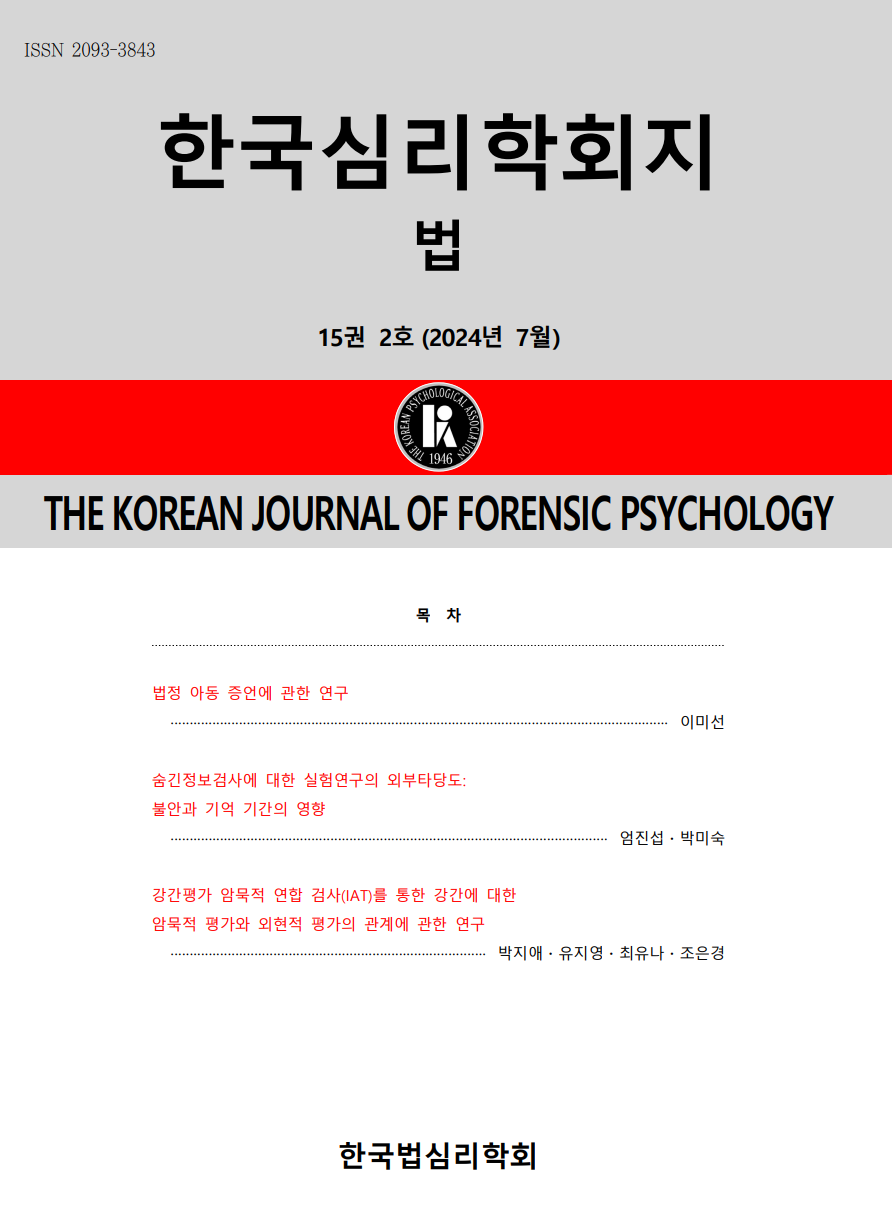open access
메뉴
open access
메뉴 ISSN : 2093-3843
ISSN : 2093-3843
The aim of this study was to verify the effect of gender and amount of criminal settlement on punitive judgment and responsibility judgment in a false rape allegation case. An online survey was conducted on 406 adult men and women and were randomly assigned to one of six experimental condition. The findings of this study are as follow. First, there was an interaction effect of the gender of the participant and the gender of the defendant in the punitive judgment and responsibility judgment except sentencing judgment. In other words, participants applied heavier punishment and sentencing judgments to the defendants of the opposite gender, while lighter punishment and sentencing judgments were applied to the defendants of the same gender. However, the amount of the criminal settlement did not have a significant effect on all dependent variables. In this study, we empirically examined how the gender of the participants, the gender of the defendant and the amount of the criminal settlement affect the judgment of the false allegation of rape case which has not yet been fully discussed in Korea. In addition, it is meaningful to see how the amount of criminal settlement, which has not been covered before, affects the perception of victims of sexual violence who demand criminal settlement. The implications and limitations of the study were also discussed.
The study explored the association between narcissism and sexual dating violence, and how ambivalent sexism affects the relation. Additionally, this study investigated if there exists gender difference in the relations between factors of narcissism and sexual dating violence, and the mediating effects of ambivalent sexism. Based on 200 participants(100 males and 100 females), the mediation effect of ambivalent sexism on the relation between narcissism and sexual dating violence was examined. For male participants, the mediation effect of hostile sexism on the relation between narcissism and sexual dating violence was significant, whereas for female participants the mediation effect of benevolent sexism on the relation between narcissism and sexual dating violence was significant. Different patterns were evident regarding the associations between factors of narcissism and sexual dating violence. For males, the more with exhibitionism and entitlement, the more with hostile sexism, and the more with sexual dating violence. For females, the more with exhibitionism, entitlement, and self-sufficiency, the more with benevolent sexism, and the more with sexual dating violence. The study revealed that the mediation effect of ambivalent sexism between narcissism and sexual dating violence differed by gender and by factors of narcissism. Finally, preventions measures for sexual dating violence were discussed.
The Comprehensive Assessment of Psychopathic Personality(CAPP) is an emerging comprehensive approach that makes use of 99 items in 33 symptoms to well-represented psychopathic personality disorder, but cross-cultural generalizability of this potential model have not endured extensive validation to date. The current study sought to validate the recently published CAPP-Self-Report form(CAPP-SR). 311 participants were derived from eleven prisons by the systematic sampling. They were administered the CAPP-SR, Triarchic Psychopathy Measure(TriPM), Levenson’s SRP(LSRP), Short Dark Tetrad(SD-4), and Korean Offender Risk Assessment-General(KORAS-G designed for predicting Korean offenders’recidivism. The results showed that the CAPP-SR total, domain, and symptom scores were generally associated with TriPM, LSRP, SD-4, and KORAS-G scores in a manner consistent with conceptual expectations. Also. the findings cross-culturally provide support for construct validity and incremental validity of the CAPP-SR in Korea as well as have clinical implications for the CAPP model more broadly, which are discussed.
This study examined public perceptions of the reasons underlying sentence reduction for defendants convicted of sex crimes against persons with intellectual disability. An online survey was conducted among 522 adults in South Korea. Respondent endorsement of 20 reasons underlying sentence reduction, which were embedded within the respective rulings, and the perceived appropriateness of statutory sentence for the crimes committed were assessed. The results showed that most respondents endorsed the sentence; moreover, those who disagreed underscored the need for more severe punishment. Almost all the respondents perceived the following reasons and explanations unfavorably: impulsiveness caused by sexual arousal or alcohol consumption; an accidental occurrence; and personal characteristics such as defendant age, health condition, socioeconomic status, developmental history, and family background. However, there was a relative agreement in that the damage caused by the incident was relatively minor, or the defendant’s reflection and attitude to recover the damage were used as reasons for the reduction. Differences in respondent perceptions of the reasons underlying sentence reduction as a function of gender and educational background were relatively small. However, younger respondents held harsher attitudes toward sentence reduction. The present findings underscore the need to be mindful of victims’ statements and the characteristics of persons with intellectual disability while sentencing.